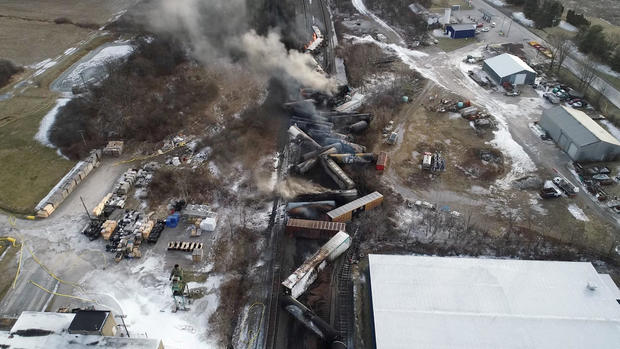Excess size caused train to break down in days before it derailed in Ohio, employees say
When Norfolk Southern train 32N derailed in Ohio earlier this month, it was not the first time it had experienced problems on the route.
The train, which originated from Madison, Illinois, on the evening of Feb. 1, broke down at least once before derailing in East Palestine, Ohio, on Feb. 3, according to employees familiar with the matter.
The employees say there were concerns among those working on the train over what they believed was the train’s excessive length and weight — 151 cars, 9,300 feet long, 18,000 tons — before it reached East Palestine, which contributed to both the initial breakdown and the derailment.
In the two weeks since, many residents who were home at the time of the derailment, or who returned after authorities conducted a “toxic release” of the hazardous chemicals on board, have told CBS News they are suffering from headaches, rashes, respiratory problems and painful coughing.
“We shouldn’t be running trains that are 150 car lengths long,” one of the employees said. “There should be some limitations to the weight and the length of the trains. In this case, had the train not been 18,000 tons, it’s very likely the effects of the derailment would have been mitigated.”
NTSB/Handout via REUTERS
CBS News has agreed not to name the employees because they fear retaliation by Norfolk Southern.
Norfolk Southern’s CEO Alan Shaw declined an interview. In a statement to CBS News, a company spokesperson said “the weight distribution of this train was uniform throughout” and included a mid-train locomotive “which helps manage the dynamic forces of the train” and reduces mechanical issues.
“Assigning a ‘reputation’ to a train that fluctuates by thousands of tons on a regular basis is inaccurate,” the spokesperson said of the observations about the train’s length and weight, adding that a “longer and heavier train” used to run the route, before it was “split into two shorter, lighter trains in the past few month as part of a regular review.”
Still, the train that derailed is considered to be “very long,” according to Sarah Feinberg, who served as administrator of the Federal Railroad Administration (FRA) from 2015 to 2017.
“When I was FRA administrator, I was not happy with the lengths of the trains, and they were 80 or 90 cars long,” Feinberg said. “This train was 50% longer.”
Feinberg said longer trains are more efficient for the railroad companies and its executives, but more challenging for the crews tasked with making repairs mid-route, a job that requires walking the length of the train to identify problems.
The employees described a system stretched to its limits.
“The workers are exhausted, times for car inspections have been drastically cut, and there are no regulations on the size of these trains,” said one employee.
In East Palestine, 38 train cars derailed, causing a fire that damaged an additional 12 cars. On Sunday, Norfolk Southern gave the Environmental Protection Agency a list of train’s contents that showed 11 of the cars that derailed carried hazardous material, including known carcinogens vinyl chloride and ethylhexyl acrylate.
The National Transportation Safety Board is currently investigating the derailment. In a statement Tuesday, the agency said it had “identified and examined the rail car that initiated the derailment,” and cited surveillance video that “showed what appears to be a wheel bearing in the final stage of overheat failure moments before the derailment.”
The derailment has shined a spotlight on Precision Schedule Railroading, or PSR, a strategy that has been widely adopted across the railroad industry and is intended to increase efficiency and reduce costs. Norfolk Southern implemented PSR in 2018.
According to a December report by the Government Accountability Office, PSR led to longer trains and an overall staff decrease of about 28% among the nation’s seven largest freight railroads, which includes Norfolk Southern.
“The railroads want to decrease costs, and as they are decreasing costs, risks are generally increasing,” Feinberg said.
PSR has led to fewer and shorter inspections of train cars, like the ones that derailed in Ohio, according to Jared Cassity, the national legislative director for one of the unions that represents Norfolk Southern workers.
“There’s a good chance the car that derailed had not been properly inspected for some time,” said Cassity, who added that the company says inspections of freight cars need to be completed in as little as 60 seconds. “You combine that with the added length and tonnage, plus the fact that it had all this hazardous material, and this was predictable. If nothing changes, it will happen again.”
For all the latest Automobiles News Click Here
For the latest news and updates, follow us on Google News.


